Law > EXAM > African Customary Law (IND2601): Indigenous law – IND203X Exam May 2020, Questions and Answers Af (All)
African Customary Law (IND2601): Indigenous law – IND203X Exam May 2020, Questions and Answers African Customary Law (University of South Africa)
Document Content and Description Below
African Customary Law (IND2601): Indigenous law – IND203X Exam May 2020, Questions and Answers African Customary Law (University of South Africa) Indigenous law – IND203X POSSIBLE EXAM QU... ESTIONS 1. Explain those factors that encourage the observance of Indigenous law. (10) 2. Discuss the unspecialised nature of indigenous law, with specific reference to criminal and procedural law. 3. Evaluate the following statements: (a) In a traditional court evidence is given under oath. (5) (b) A traditional leader is empowered to punish anyone. (5) (c) Institutional action excludes unlawfulness. (5) 4. Discuss the execution of a sentence by an indigenous court. (10) 5. What punishments could formerly be imposed for contempt of the ruler? Do these punishments still apply today? (5) 6. Write critical notes on appeals against the findings of both criminal and civil courts in their rulings regarding traditional leaders. (10) 7. Discuss the indigenous principles of succession in traditional leadership. Indicate the extent to which these principles are recognised in modern indigenous law. (25) 8. Discuss strategies and procedures that were developed generally for handling disputes in African customary law. 9. Write notes on the implications of Sections 30 and 31 of the Constitution of the Republic of South Africa, 1996, for the recognition of customary law. (10) 10. Evaluate the following statements: (a) A family head can make certain allotments during his lifetime. (5) 11. Conflict between customary law and the Bill of Rights in unavoidable. Evaluate this statement. (3) 12. The Constitution indicates that fundamental rights have priority over customary law. List and explain examples of this. (3) 13. The family head's control over house property does not give him the authority to allocate marriage goods for daughters in one house to another house. Evaluate the statement. 14. In 2002, Vuyo ( a male aged 22) and Karabo ( a female aged 17) and their respective fathers concluded an agreement in terms of which Vuyo had to deliver five head of cattle and R10 000 as lobolo to Karabo's family. Vuyo delivered part of the lobolo agreed upon and, shortly afterwards, Karabo was allowed to reside with Vuyo and his family. Their marriage was never registered. (a) Did a legally valid marriage come into being between Vuyo and Karabo? (b) If we assume that a valid marriage did come into being between Vuyo and Karabo: (i) What are the general consequences for them as husband and wife in terms of customary law? (ii) Can Vuyo enter into a further customary marriage with another woman? (iii) If he does, will Vuyo have to follow any particular procedures to regulate the matrimonial property system of his marriages? 15. What effect does the dissolution of a customary marriage have on marriage goods? 16. Distinguish between a general and a particular administrative determination. Why is this distinction important? 17. Mr Mbuyazwe, a traditional leader, issued several determinations regarding his subjects conduct during times of bereavement. One of the determinations determines that, when families are in mourning, nobody in their neighbourhood should engage in any work activity until the day after the funeral. The bereaved families are also barred from providing meals to persons attending the funeral. Buza's father, who is a subject of Mr Mbuyazwe, passed away shortly after the announcement of the determinations. Some of his relatives came from far to attend the funeral and Buza's family therefore decided to provide them with food. They consequently cooked a meal on the day of the funeral and served it to Buza's relatives. Advise Buza on the steps he can take if Mr Mbuyazwe decides to fine him for not obeying his orders in terms of : (a) African customary law: (b) Common law: 18. Discuss the implications of section 211 of the Constitution for the recognition of indigenous law. 19. Discuss form of punishment and the determination of punishment in indigenous criminal law. 20. Briefly explain the basis of liability of the head of an agnatic group for crimes committed by members of his group. 21. Define the following terms/concepts: 22. Evaluate the following statements: (a) The family head's control over house property does not give him the authority to allocate marriage goods for daughters in one house to another house. (b) The ilobolo contract is an example of a real contract. (c) In original indigenous law, ownership of land was not subject to any limitations. 23. Briefly outline the changes that the Recognition of Customary Marriages Act 120 of 1998 has brought about with regard to the proprietary consequences of a customary marriage. 24. State the general principles of the indigenous law of succession. 25. Define the following terms/concepts: (a) Polygyny (b) Customary law (c) Personal property 26. Customary marriage law has been drastically amended by the Recognition of Customary Marriages Act 120 of 1998. Discuss this statement with reference to: (a) the legal requirements for customary marriages that were validly in existence before 15 November 2000 and marriages entered into after this date. (b) The way in which customary marriages are dissolved. 27. Evaluate the following statements: (a) Indigenous law is an expression of community values. (b) A juristic person was recognised in original indigenous law. (c) A delict may be defined as an act which lawfully infringes the rights of another. 28. Write notes on the consequences of the betrothal. 29. Distinguish between "general succession" and "special succession". 30. Discuss the implications of Section 1 of the Law of Evidence Amendment Act 45 of 1988 on the recognition of indigenous law in South Africa. 31. Explain the following legal maxims: (a) Mpa e sewa ke moladi wa yona ('a pregnancy is decided on with the sleeping partner present'). (b) Molato ga o rere mongwe ('one debt is not heard by another'). (c) Molato ga o bole ('a debt or case does not decay or expire') 32. Discuss guilt (culpability) as an element of a crime according to indigenous law. 33. Discuss the inconsistencies which have been brought about by the recognition of traditional leadership. 34. Define the following terms/concepts: (a) The levirate system (b) the ukuvusa custom 35. Explain the legal significance of "Mangangahlae". 36. Explain how a person's status is influenced by a factor such as his or her gender. 37. Briefly outline the most important general consequences of a traditional indigenous marriage. 38. Evaluate the following statement: (a) Spouses in a customary marriage entered into before 15 November 2000 may never change the matrimonial property system governing their marriage(s). 39. Explain the following maxim: (a) "selepe ga se itheme" (an axe does not chop itself). 40. Distinguish between defence and necessity in indigenous law. 41. Discuss the different forms of the custom of substitution in both the original and modern indigenous law. (20) 42. In 1960, Thabo (a 17 year old boy) and Zandi (a 16 year old girl) and their respective fathers concluded an agreement in terms of which Thabo had to deliver six head of cattle and R5000 as lobolo to Zandi’s family. Thabo delivered the lobolo agreed upon and shortly thereafter Zandi was allowed to reside with Thabo and his family. In 1962, twin daughters were born to them namely Nonhlanhla and Bongiwe. However, Zandi experienced some complications during childbirth and she died. A few years after her death, Thabo discovered that Zandi was actually a member of the clan of his mother’s people. (a) Did a legally valid marriage come into being between Thabo and Zandi? (7) (b) Would a legally valid marriage have come into being between Thabo and Zandi if they concluded their marriage on 10 December 2000? (8) 43. In 1964, Thabo enters into a valid customary marriage with Fikile. Fikile gave birth to a son named Senzo and a daughter named Lungile. In 1985, Zandi’s house (hereinafter referred to as house Z) concluded an agreement with Fikile’s house (hereinafter referred to as house F) in terms of which house Z had to provide five head of cattle to house F, which house F required as lobolo for Senzo(21). House F appointed Lungile(19) as the source from which the debt was to be repaid. House Z delivered the five head of cattle but when house F received lobolo for Lungile in 1987, house F refused to transfer the lobolo to house Z on account that the debt had prescribed. As a result, house Z decided to take house F to court for the outstanding debt. Discuss the legality of: (a) the agreement between house Z and house F and the defence of house F that the claim has prescribed (4) (b) the decision of house Z to take house F to court. (4) 44. In 1989, Thabo decided to allot certain property to his daughter Nonhlanhla. He allotted a blanket and a sleeping mat to her which belonged to his mother. In the same year, Thabo informed Bongiwe that he had concluded an agreement with Philasanda and his father in terms of which Philasanda had to deliver betrothal goods and some of the lobolo agreed upon before the marital union between Philasanda and Bongiwe could be concluded. He also informed her that Philasanda had already delivered the betrothal goods. Much to the disappointment of Thabo, Bongiwe informed him that she had been ‘seeing’ a young man named Xolani for the past six months and was pregnant with his child. Upon hearing of her demise, Philasanda terminated the betrothal agreement. (a) The facts reveal that Thabo made an allotment to his daughter Nonhlanhla. Can Thabo make such allotments during his lifetime? (b) Could Thabo, or any other person, claim legal redress in respect of Bongiwe’s defloration? If so, what is the nature of the legal redress? (8) (c) Besides Bongiwe’s defloration, have any other rights in respect of her been violated? What happens to the betrothal goods upon termination of the betrothal? (3) 45. In 1995, Thabo suffers a severe heart attack and dies. His estate comprised: • marriage goods received for Lungile; • compensation in respect of the seduction of Bongiwe; and • land which had been allocated to him by the traditional authority, and had not been allotted to a particular house. Thabo also had an outstanding debt to pay, namely additional cattle in respect of his son Senzo’s lobolo. At the time of his death, Zandi’s sister, Thandi, claims that her son Mandla(33) is the rightful successor to Thabo’s estate as she bore him after she substituted her sister Zandi. Unbeknown to Thabo’s present wife and children, both Thabo’s and Zandi’s families were aware of the substitutionary arrangement and Thabo had made a public declaration of the union between himself and Thandi. Explain how Thabo’s estate will devolve. (10) 46. Give an example of how the unspecialised nature of indigenous law regarding the farming-out contract is reflected in each of the following main characteristics of indigenous law. (7) (a) group v individual orientation; (b) concrete v abstract; (c) the religious element; (d) time; (e) kinship. 47. Status is linked to a person’s legal position or standing and it determines the powers a person has. Discuss the factors influencing a person’s status in indigenous law. 48. Briefly outline the position in regard to movable property in original indigenous law. (10) 49. Evaluate the following statements. (a) The nature of restitution and compensation for the defloration of a girl is the same amongst the Zulu and Pedi peoples. (5) (b) The ukuzalela custom is practised when a married woman is unable to procreate a successor. (5) (c) Married men have full power with regard to their family and house property. (5) 50. In 2002, Vuyo (a male aged 22) and Karabo (a female aged 17) and their respective fathers concluded an agreement in terms of which Vuyo had to deliver five head of cattle and R 10 000 as lobolo to Karabo’s family. Vuyo delivered part of the lobolo agreed upon and shortly thereafter, Karabo was allowed to reside with Vuyo and his family. Their marriage was never registered. (a) Did a legally valid marriage come into being between Vuyo and Karabo? (7) (b) If we assume that a valid marriage did come into being between Vuyo and Karabo, (i) what are the general consequences for them as husband and wife in terms of indigenous law? (5) (ii) can Vuyo enter into a further customary marriage with another woman? (1) (iii) if he does, will Vuyo have to follow any particular procedures to regulate the matrimonial property system of his marriages? (9) 51. What effect does the dissolution of an indigenous marriage have on marriage goods? 52. Name the most important implications of Section 1 of the Law of Evidence Amendment Act 45 of 1988. (10) 53. Discuss indigenous law as an unspecialised law with specific reference to public law. 54. for subjects wronged by an administrative action of a ruler. 55. Indicate how the conflict between the principles of indigenous law and fundamental rights should be dealt with. [20] 56. In indigenous law there are certain crimes that can defile the community. Evaluate this statement. (5) 57. Discuss the implications that could follow should the principle of patrilineal succession be abolished. (15) 58. Explain how the Traditional Leadership and Governance Framework Act 41 of 2003 has provided for the resolution of succession disputes in indigenous law. 59. Discuss indigenous law as unspecialised law with specific reference to the betrothal. [20] 60. What is meant by specialisation? Indicate the similarities between specialised and unspecialised legal systems. (10) 61. Compare the legal requirements for a traditional customa;ry marriage, a customary union and a customary marriage. [10] 62. Outline the distinction between general property and house property. (8) General property: 63. Zwai (a male aged 26) and Puleng (a female aged 23) want to enter into a customary marriage. According to the law and custom of both Zwai and Puleng, Zwai has to deliver lobolo to Puleng’s family. Puleng, however, refuses to marry in terms of a lobolo agreement and appeals to section 9 of the Constitution of the Republic of South Africa, 1996. (a) In this case, what specific constitutional rights are in conflict? 64. Discuss indigenous law as unspecialised law with specific reference to the law of marriage. 65. Discuss rape as a crime in indigenous law. [Show More]
Last updated: 1 year ago
Preview 1 out of 58 pages
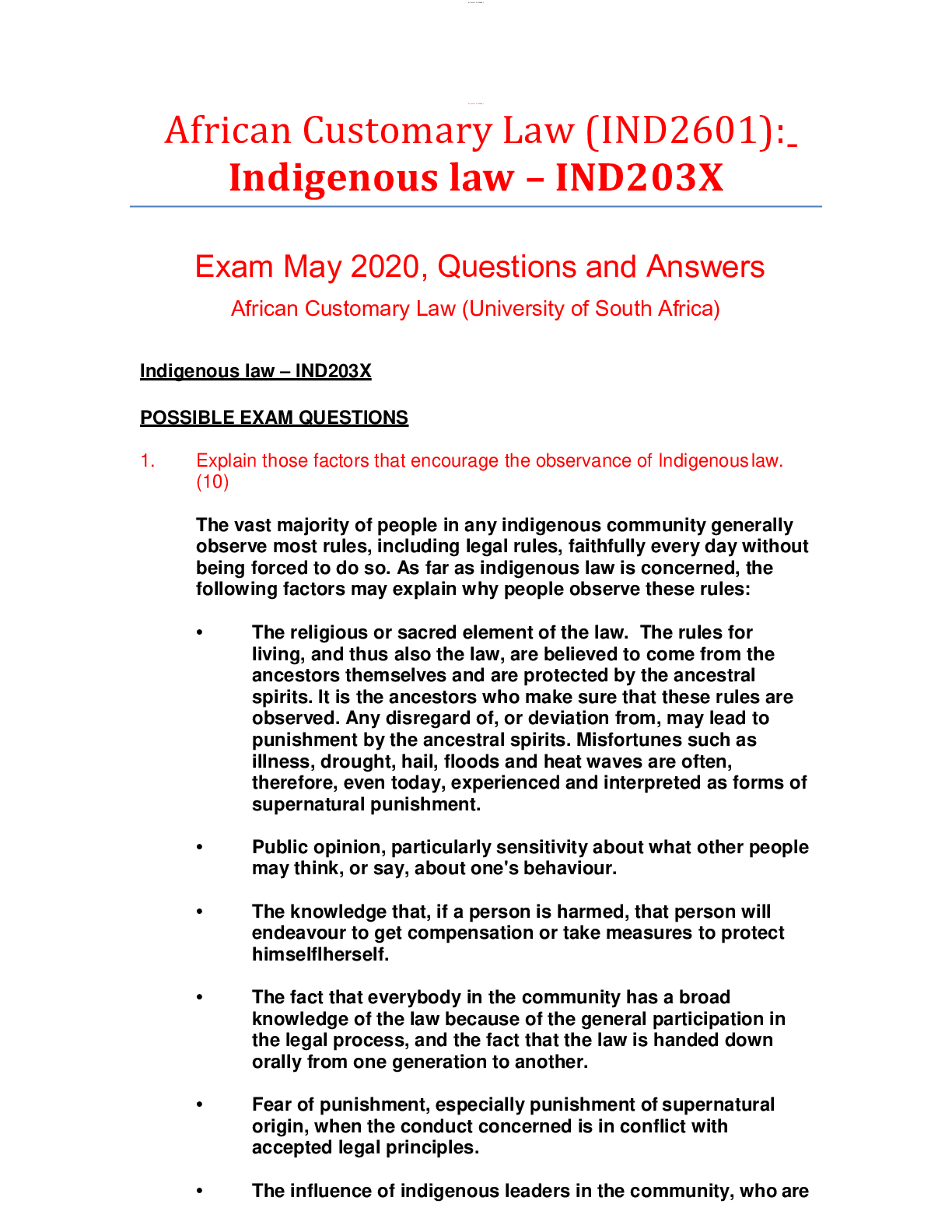
Reviews( 0 )
Recommended For You
Psychiatry> EXAM > NRNP 6541 MIDTERM EXAM MAY 2022 WITH ANSWERS (All)
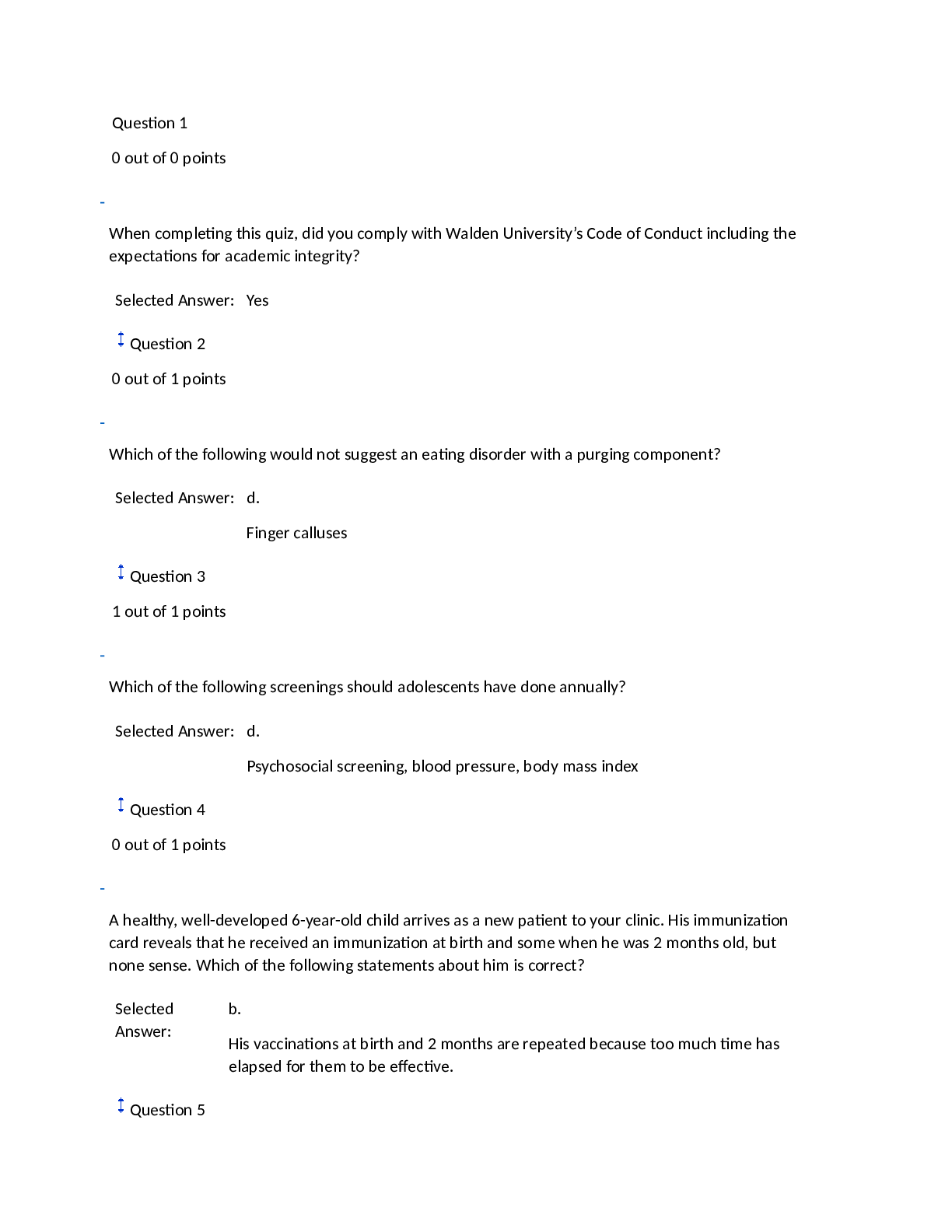
NRNP 6541 MIDTERM EXAM MAY 2022 WITH ANSWERS
NRNP 6541 MIDTERM EXAM MAY 2022 WITH ANSWERSNRNP 6541 MIDTERM EXAM MAY 2022 WITH ANSWERSNRNP 6541 MIDTERM EXAM MAY 2022 WITH ANSWERSNRNP 6541 MIDTERM EXAM MAY 2022 WITH ANSWERSNRNP 6541 MIDTERM EXAM M...
By IMMANUEL , Uploaded: Jul 10, 2022
$12
Psychiatry> EXAM > NRNP 6541 MIDTERM EXAM MAY 2022 CORRECT ANSWERS (All)

NRNP 6541 MIDTERM EXAM MAY 2022 CORRECT ANSWERS
NRNP 6541 MIDTERM EXAM MAY 2022 CORRECT ANSWERS NRNP 6541 MIDTERM EXAM MAY 2022 CORRECT ANSWERS NRNP 6541 MIDTERM EXAM MAY 2022 CORRECT ANSWERS NRNP 6541 MIDTERM EXAM MAY 2022 CORRECT ANSWERS NRNP 654...
By DOCTOR BEN , Uploaded: Jul 10, 2022
$13
Paediatrics> EXAM > NRNP 6541 MIDTERM EXAM MAY 2022 WITH ANSWERS (All)

NRNP 6541 MIDTERM EXAM MAY 2022 WITH ANSWERS
NRNP 6541 MIDTERM EXAM MAY 2022 WITH ANSWERS NRNP 6541 MIDTERM EXAM MAY 2022 WITH ANSWERS NRNP 6541 MIDTERM EXAM MAY 2022 WITH ANSWERS NRNP 6541 MIDTERM EXAM MAY 2022 WITH ANSWERS NRNP 6541 MIDTERM EX...
By Otieno , Uploaded: Jul 10, 2022
$12
Law> EXAM > General Principles of Criminal Law (CRW2601) Exam 2020, Questions and Answers. General Principles of Criminal Law (University of South Africa) (All)
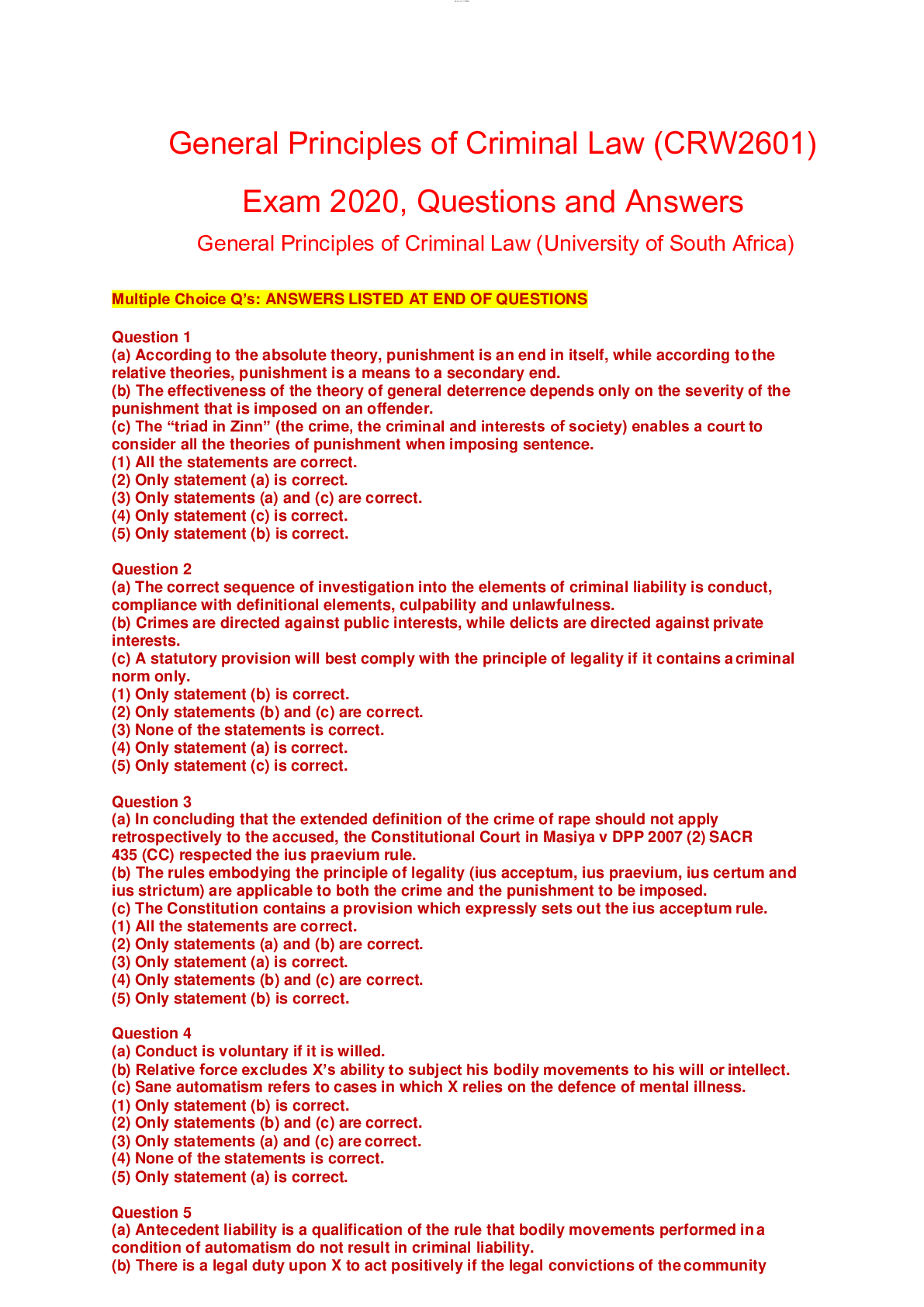
General Principles of Criminal Law (CRW2601) Exam 2020, Questions and Answers. General Principles of Criminal Law (University of South Africa)
General Principles of Criminal Law (CRW2601) Exam 2020, Questions and Answers General Principles of Criminal Law (University of South Africa) Multiple Choice Q’s: ANSWERS LISTED AT END OF QUESTION...
By QuizMaster , Uploaded: Jul 31, 2020
$9.5
*NURSING> EXAM > NURS 6541 PEDIATRIC FINAL EXAM MAY 2020 (Questions & Correct Answers) (All)
.png)
NURS 6541 PEDIATRIC FINAL EXAM MAY 2020 (Questions & Correct Answers)
NURS 6541 PEDIATRIC FINAL EXAM MAY 2020 (Questions & Correct Answers)
By quizprof , Uploaded: Jan 28, 2022
$15
*NURSING> EXAM > NR 503 Study Guide For Final Exam May,2018 (All)
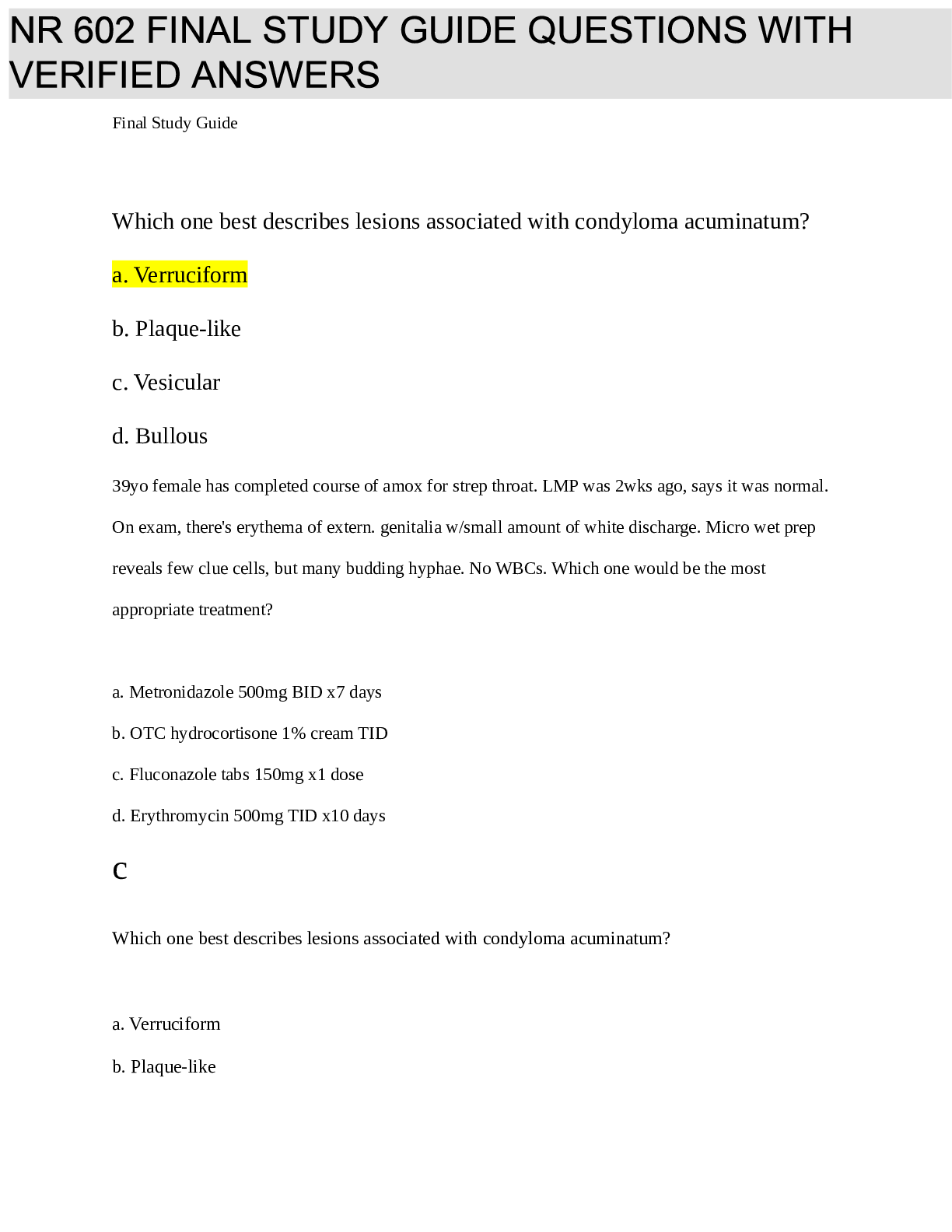
NR 503 Study Guide For Final Exam May,2018
NR 503 Study Guide For Final Exam May,2018
By Ebooks , Uploaded: Aug 29, 2021
$8.5
Business> EXAM > TAXATION FIRST PRE-BOARD EXAM MAY 2021 (All)

TAXATION FIRST PRE-BOARD EXAM MAY 2021
TAXATION FIRST PRE-BOARD EXAM MAY 2021
By kingamor , Uploaded: Jul 29, 2021
$13
Law> EXAM > Practice Exercises for Exam with Answers.pdf Competition And Consumer Law (University of Melbourne) (All)
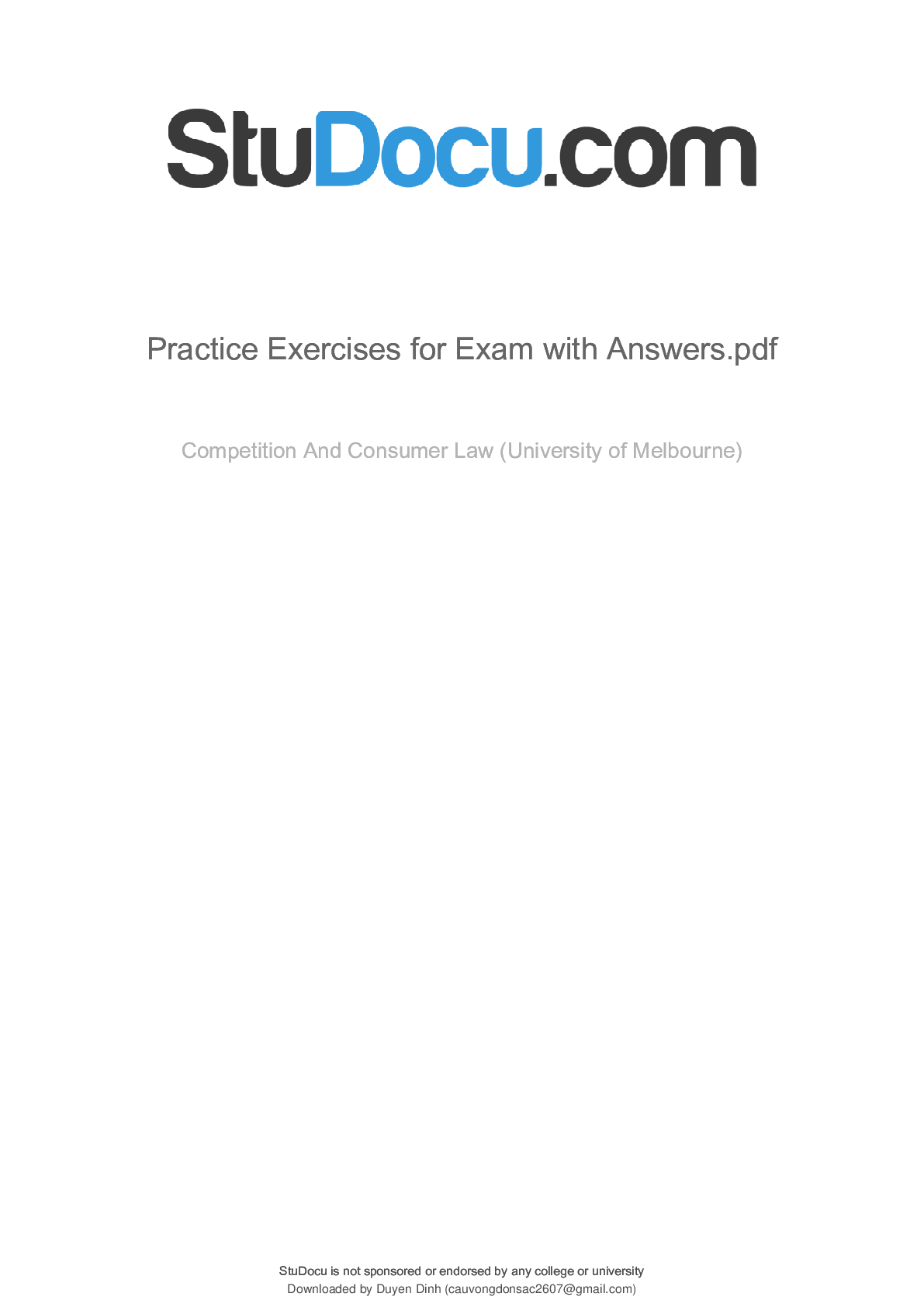
Practice Exercises for Exam with Answers.pdf Competition And Consumer Law (University of Melbourne)
1. Choose the incorrect statement regarding the steps in the process for resolving a legal dispute in court: ☐ A court undertakes its own separate investigation to establish...
By Prof.Pierro , Uploaded: Jun 25, 2021
$5
Law> EXAM > Introduction to Law (ILW1501): EXAM 13 May 2019, Questions and Answers Introduction to Law (University of South Africa). Grade A Guarantee. (All)
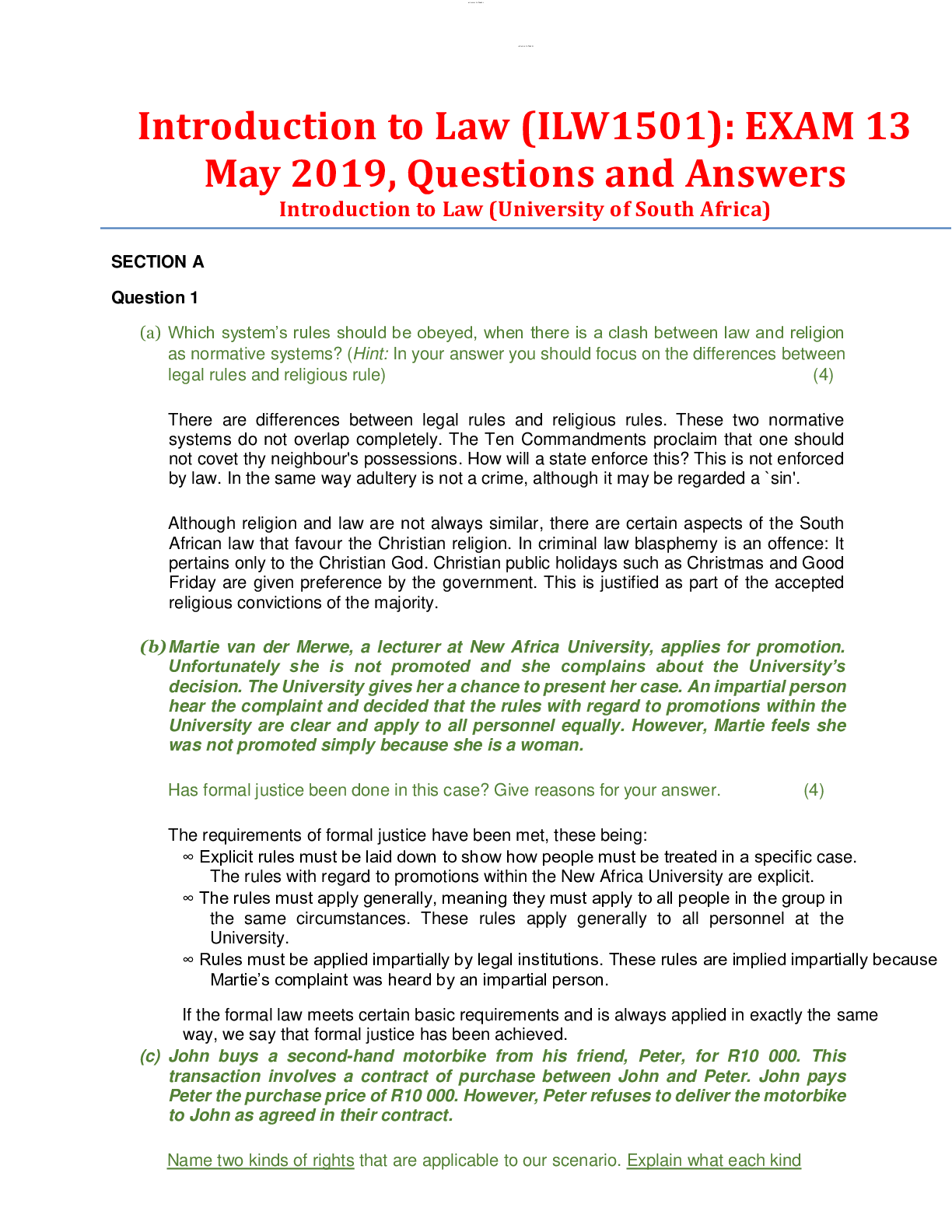
Introduction to Law (ILW1501): EXAM 13 May 2019, Questions and Answers Introduction to Law (University of South Africa). Grade A Guarantee.
SECTION A Question 1 (a) Which system’s rules should be obeyed, when there is a clash between law and religion as normative systems? (Hint: In your answer you should focus on the differences bet...
By QuizMaster , Uploaded: Aug 01, 2020
$9
*NURSING> EXAM > NURS 6541 final Exam may 2020 -LATEST REVIEW (All)
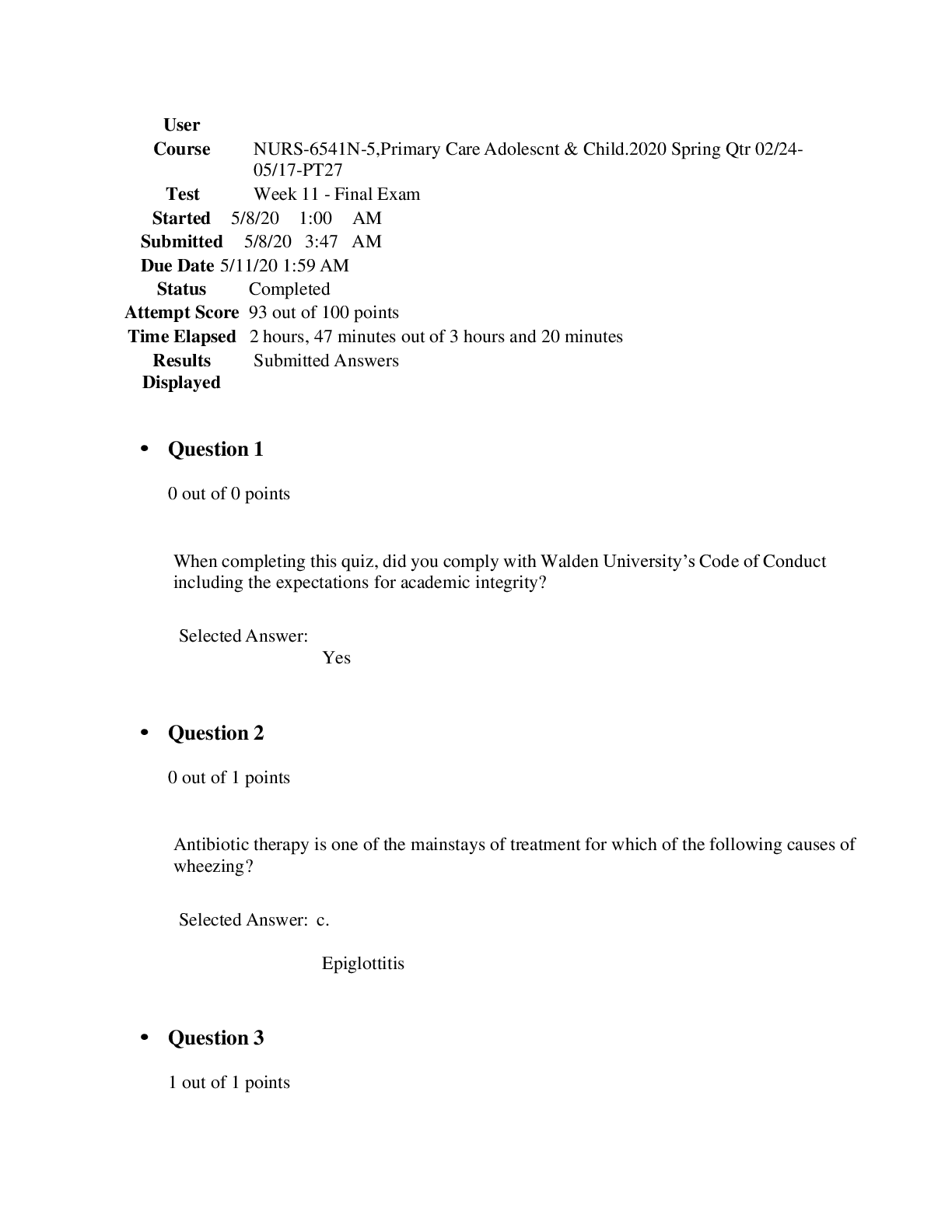
NURS 6541 final Exam may 2020 -LATEST REVIEW
NURS 6541 final may 2020 Question 1 1 out of 1 points A small-for-gestational-age, dysmorphic newborn infant has microcephaly and sloping forehead, cutis aplasia (missing portion of the skin and h air...
By PROF , Uploaded: Jan 27, 2021
$10
Document information
Connected school, study & course
About the document
Uploaded On
Jul 30, 2020
Number of pages
58
Written in
Additional information
This document has been written for:
Uploaded
Jul 30, 2020
Downloads
0
Views
418






